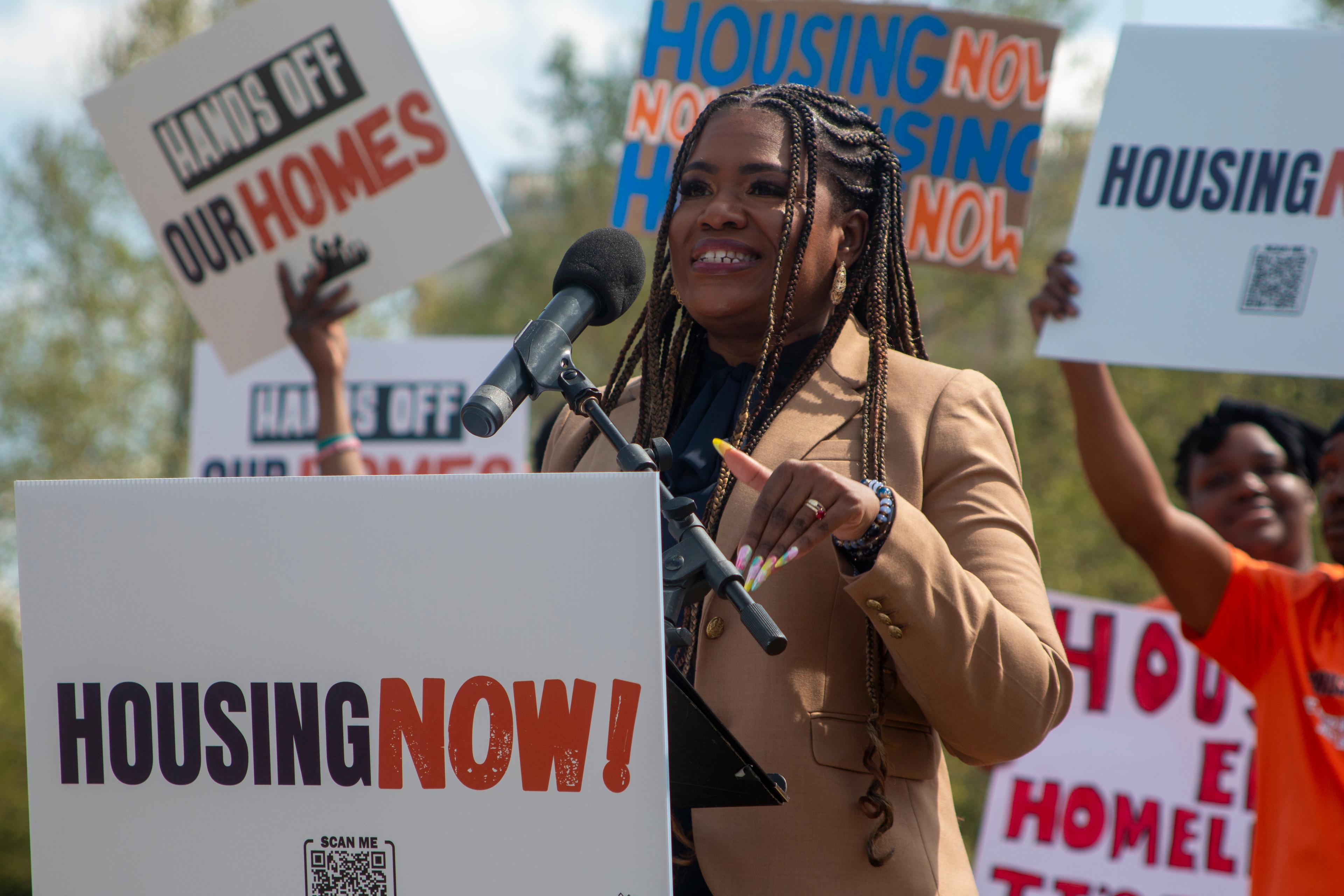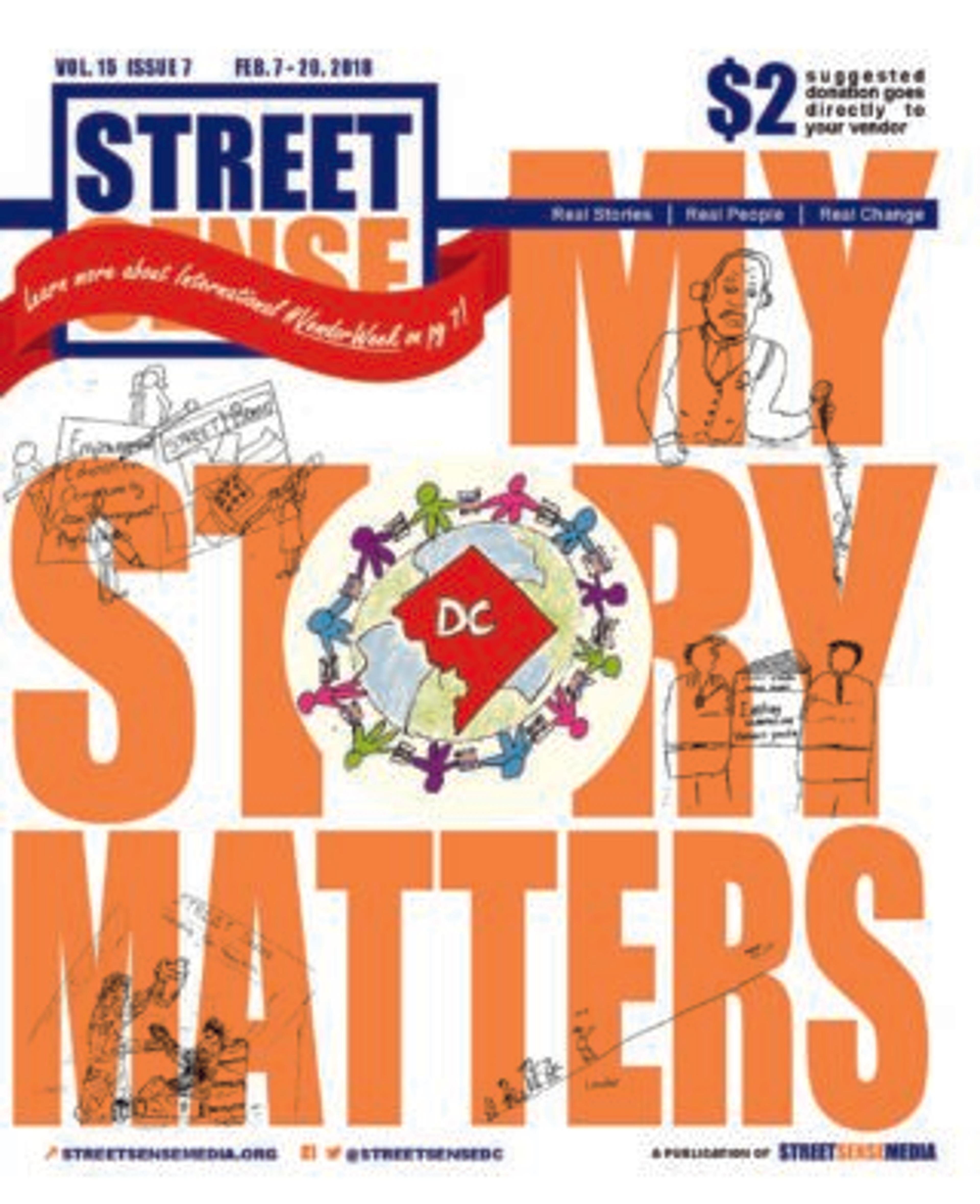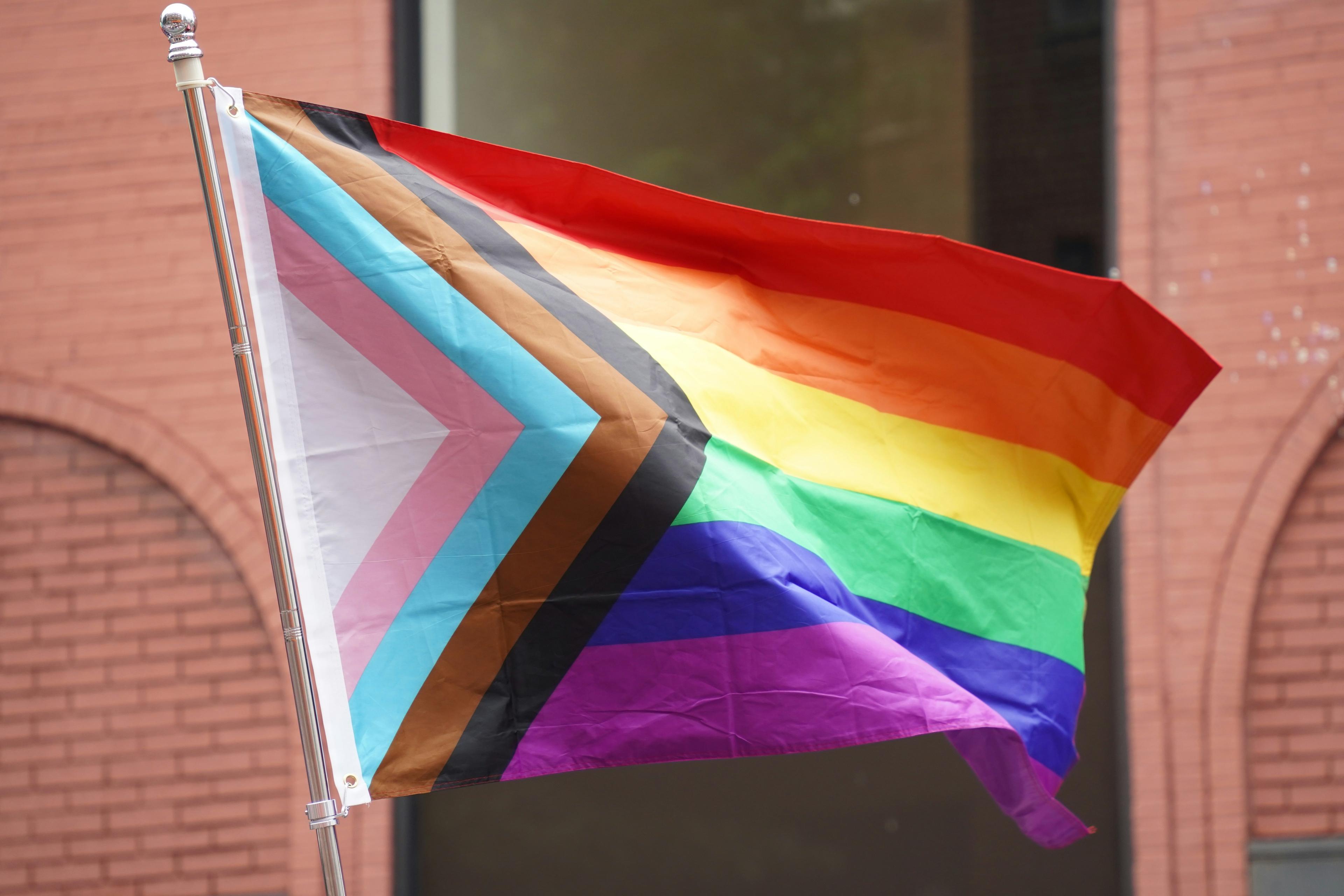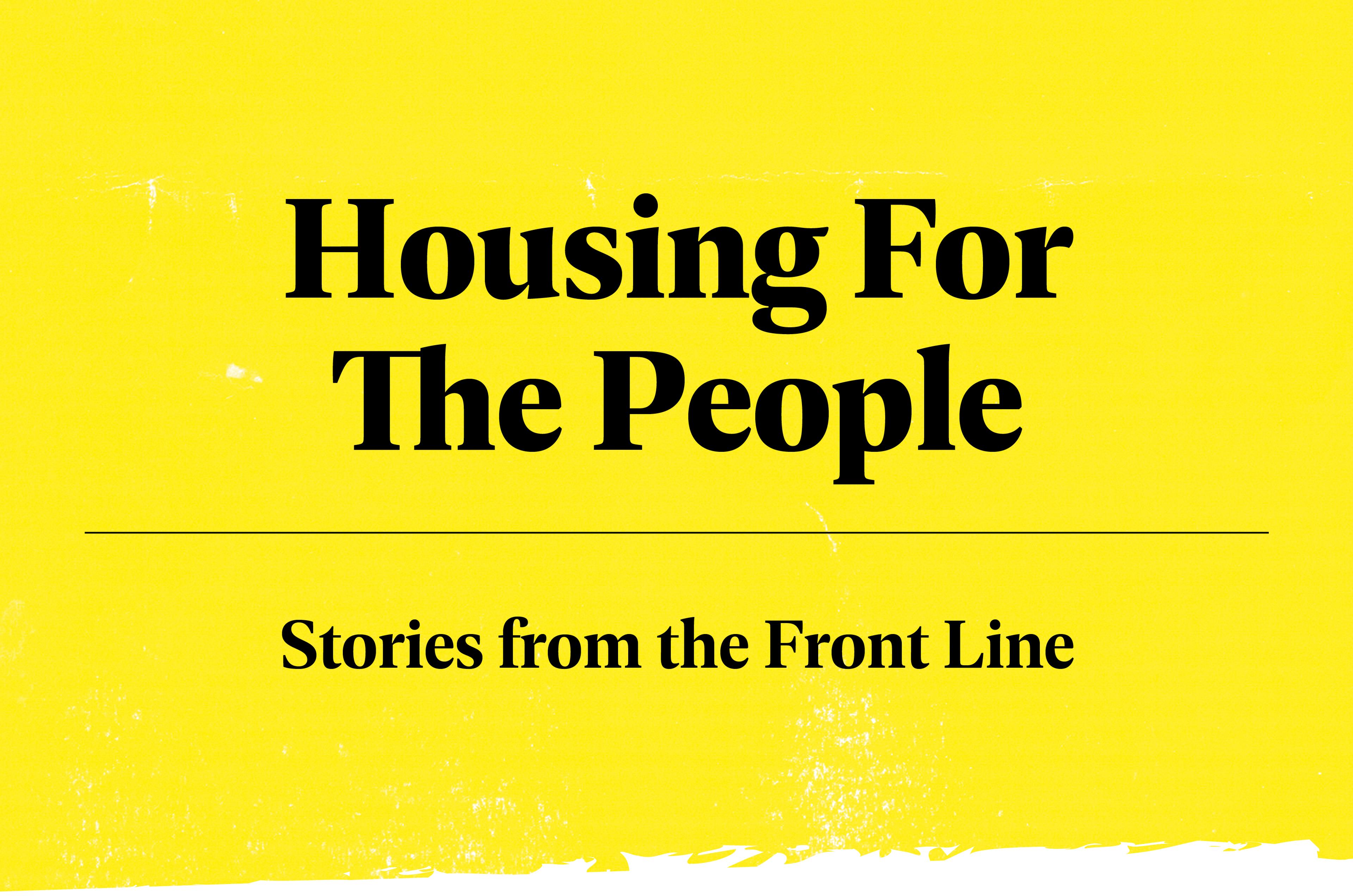One year after SCOTUS decision allowing cities to criminalise sleeping in public, rallies call attention to cuts in homelessness services

Courtesy of Street Sense Media
By Atmika Iyer
- Lived experience

A year after the Supreme Court allowed cities to criminalise sleeping outside, homelessness advocates gathered outside the Capitol to call attention to what they see as a worsening crisis. The National Coalition for the Homeless organized the 22 April rally, drawing a crowd of 75 people. In bright orange shirts, participants turned homemade signs toward the onlookers, calling for “#HousingNow”.
The rally, held nationwide in cities like Los Angeles, Chicago, and Washington DC, called attention to the criminalisation of homelessness following the court’s 2024 decision in the landmark case Grants Pass v. Johnson and the Trump administration’s budget and staff cuts for homelessness and housing services.
“We say yes to housing and healthcare and no to funding cuts, fines, and jails,” former Missouri Democratic representative Cori Bush told the crowd in DC.
Bush was once homeless herself, she said, living in a car in St. Louis with her husband and two babies in 2001. She went on to fight for legislation to protect homeless populations as a two-term member of Congress. Bush attended the National Coalition for the Homeless protest one year ago after the ruling in Grants Pass v. Johnson and felt that it was important to come back a year later.
“My work on this issue started years ago, started before I ever entered Congress, started in my hometown,” Bush said in an interview with Street Sense. “Once I overcame my issues, my homelessness and my housing instability, even after that, I began to do the work to push our legislators to do more in our community. So, it’s important to be here again.”
Last year’s ruling in Grants Pass v. Johnson was a huge disappointment for many homelessness advocates, who worried that the court’s decision to allow local jurisdictions to ban sleeping outside would lead to the displacement and arrest of people experiencing homelessness. Supreme Court Justice Neil Gorsuch penned the 6-3 majority decision, stating that while homelessness is a complex issue, local governments need the legal authority to dismantle encampments for safety reasons.
“These public-camping regulations are not usually deployed as a front-line response ‘to criminalize homelessness,’” Gorsuch wrote in the majority opinion. “Instead, they are used to provide city employees with the legal authority to address ‘encampments that pose significant health and safety risks’ and to encourage their inhabitants to accept other alternatives like shelters, drug treatment programs, and mental-health facilities.”
At least 150 cities in America passed ordinances criminalising homelessness following the SCOTUS ruling in Grants Pass v. Johnson, according to Stateline, including Peoria, Illinois, Riverside, California, and many more.
“There are communities around the country that have jumped on board quickly to be able to continue to punish people, to arrest, to detain people who just need shelter,” Bush told Street Sense after her speech. “It’s a shame on this country, and it’s a shame on this country without a label of a party or a particular group of legislators. This falls on everyone, because everyone had a hand in this.”
Since President Donald Trump took office, he has proposed banning encampments and forcing people experiencing homelessness into sanctioned “tent cities” under threat of arrest. He also signed an executive order on 28 March “requiring [the] prompt removal and cleanup of all homeless or vagrant encampments and graffiti on Federal land within the District of Columbia.”
Speakers at the rally criticised Trump’s policies, including his decision to place the entire US Interagency Council on Homelessness, the only federal agency addressing solutions to homelessness, on administrative leave. The president has also proposed cutting funding for housing vouchers, which are the primary way that people experiencing homelessness move into housing.
Amanda Andere, CEO of Funders Together to End Homelessness, spoke against Trump’s proposals to put people experiencing homelessness in camps and to prioritise addiction and mental health provisions while cutting supportive housing programs, policies that she believes will make it harder to end homelessness.
“I still have hope, but that hope is tempered by what’s happening right now with this administration, who I don’t think understand what is needed in the community. The things that they are cutting, they don’t realise how interconnected they are to being able to house everyone,” Andere said in an interview with Street Sense. “They say homelessness is a problem, but their solution is to put people in camps, not to think about a strategy around housing.”
Beyond encampments, Andere worried that cuts to Medicaid, the US Department of Housing and Urban Development (HUD), and other programs will exacerbate the challenges that people experiencing homelessness face.
“We know that if you cut Medicaid, that means you cut healthcare and housing options for the most vulnerable in our community and potentially put more people in a precarious housing situation,” Andere said. “There’s a lot of threats coming. It’s not just one thing.”
Ashaki Robinson, president of the AFGE Local 476 union representing HUD workers, also spoke to the crowd about the potential upcoming cuts to HUD, including Section 8 housing vouchers, which provide rental assistance to low-income households. Trump’s smaller government, she said, will lead to an “erosion of the services and the institutional knowledge that you need to actually keep the government running.”
“When you cut the staff, you actually end up cutting the program,” Robinson said in an interview with Street Sense. “That’s essentially what this administration is doing, scaring the staff to leaving and leaving prematurely. And there’s a lot of institutional knowledge that’s leaving.”
Advocates for people experiencing homelessness are anticipating that cuts to programs that serve unhoused people and orders to close encampments are just the beginning of the Trump administration’s attack on the rights of people experiencing homelessness.
Despite last year’s Supreme Court ruling, Andere said that these rallies were meant to show people experiencing homelessness solidarity while fighting for everyone in the US to have a home.
“When you are unhoused, you feel very lonely, very isolated,” Andere said, “and I hope these rallies and events around the country remind people they are not alone, that we are in the fight with them, and we are not going to stop fighting until every person is housed.”

